Donor database buyer’s guide: Choosing the best solution

A good donor database doesn’t just store your nonprofit organization’s data — it also allows you to leverage that data to optimize your communication, engagement, and donor acquisition strategies so you can further your cause.
That’s why selecting a donor management software to maintain your database is an essential project that deserves serious consideration and effort.
Let’s explore why having a donor database is important, which essential features you need, and how to choose a system that can sustain your nonprofit in the long term.
What is a donor database?
A nonprofit donor database, otherwise known as a nonprofit constituent relationship management (CRM) system, is software that allows organizations to track and utilize important data about their donors, volunteers, and other supporters.
For nonprofits, this database is a centralized source of truth for everything from donor contact details to when a supporter is most likely to give.
How can your nonprofit benefit from a donor database?
The information stored in your donor database software can be used to personalize messages to supporters, identify potential major donors, evaluate the success of fundraising campaigns, and much more.
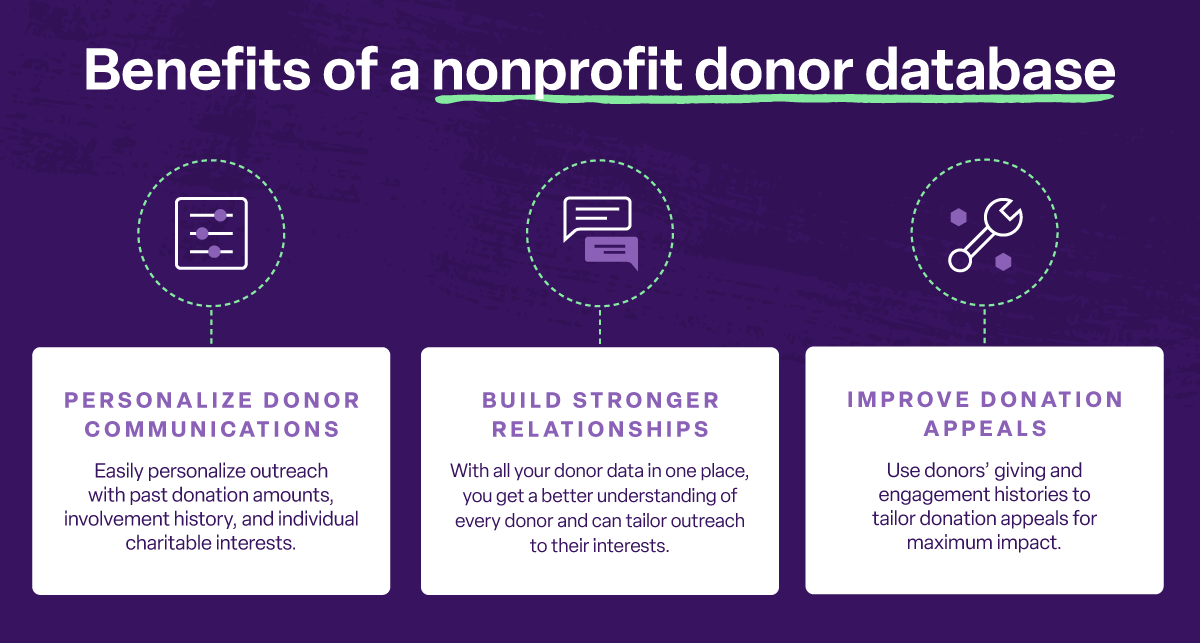
A robust database for fundraising makes it easy to collect and manage relevant data, allowing you to:
- Personalize communications: Basic personal information, such as name and email address, will allow you to communicate effectively with donors while personalizing bulk emails. Additionally, demographics and giving data help you segment donors to target messaging appropriately. For example, you may send more formal written letters to older donors while sending casual text messages to younger donors.
- Build stronger relationships: The information in your donor database can be instrumental for your relationship-building efforts. Specifically, a donor’s motivations for giving and charitable interests can be the most important information in building a meaningful, long-lasting relationship.
- Improve donation appeals: Data on donors’ past gift amounts, giving patterns, and the campaigns they donated to can all be used to personalize and improve fundraising appeals. For example, if a donor regularly gives in December, you might send an end-of-year appeal letter to recognize their previous donations and make it simple for them to give again.
In addition to all the benefits that come with unified data, some donor databases have even more features to benefit your nonprofit. Automation, bulk communication tools, and more can help you engage your donors successfully and surpass your fundraising goals.
Essential features of a robust donor database
In order to collect the necessary data and access all the benefits of a good donor database, you need to choose one with the right features. Let’s explore the most essential nonprofit CRM requirements.
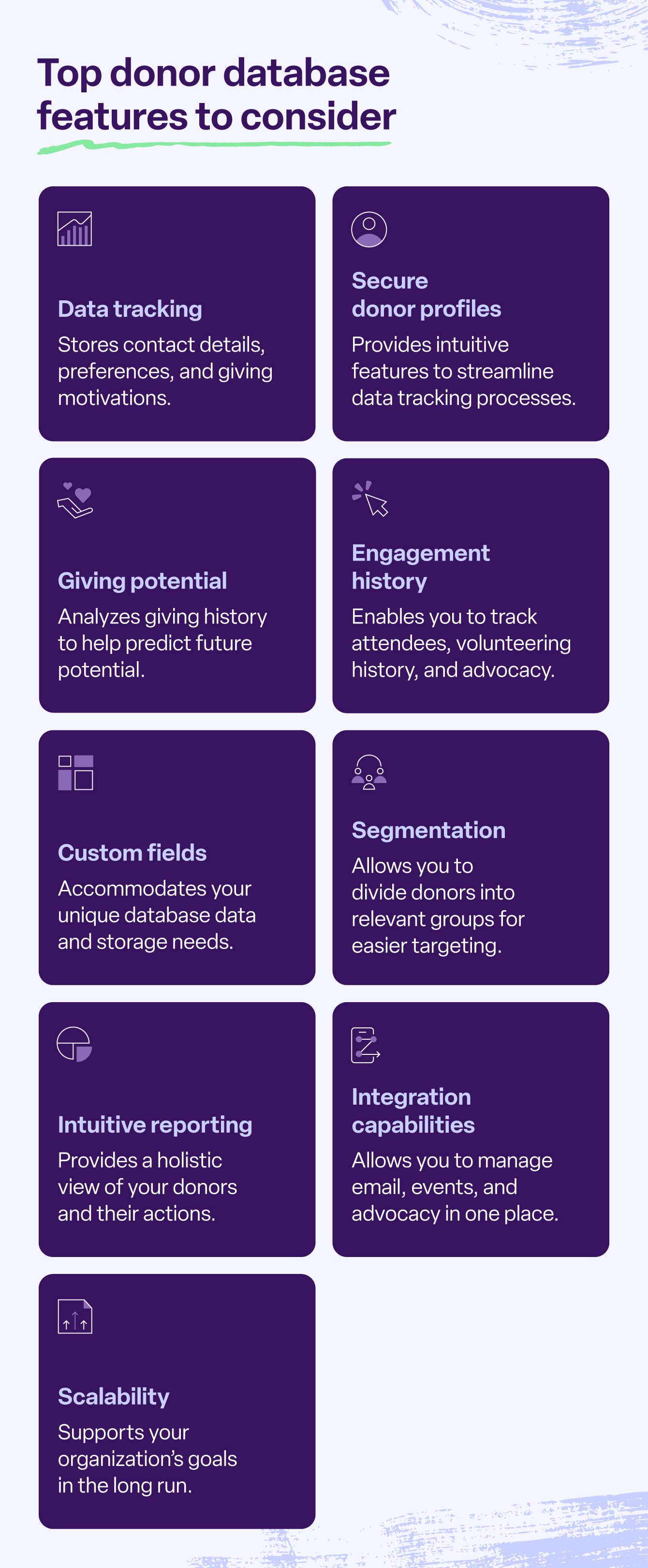
Data tracking
Donor databases don’t just house email addresses and give data — you can collect plenty of valuable donor retention data to better understand your supporters and ultimately improve their experience with your nonprofit.
Robust data tracking features to consider include:
- Contact details, including phone numbers, mailing addresses, and email addresses
- Demographic information like age, gender, socio-economic status, and education level
- Communication preferences, such as whether they prefer receiving emails or text messages
- Employment information so you identify potential corporate giving opportunities
- Giving patterns such as their average donation size and the times of the year, they tend to donate
- Engagement history including the events they’ve attended, times they’ve volunteered, and other ways they engage with your organization
- Charitable interests or specific cause areas they’re most passionate about
- Motivations for giving, such as a loved one being impacted by your purpose
Additionally, track custom information that is uniquely important to your nonprofit. For example, if you work at an animal shelter, it may be important for your donor database to track what pets your donors own. Custom data points like this will allow for richer, more personalized communications that strengthen your donor relationships.
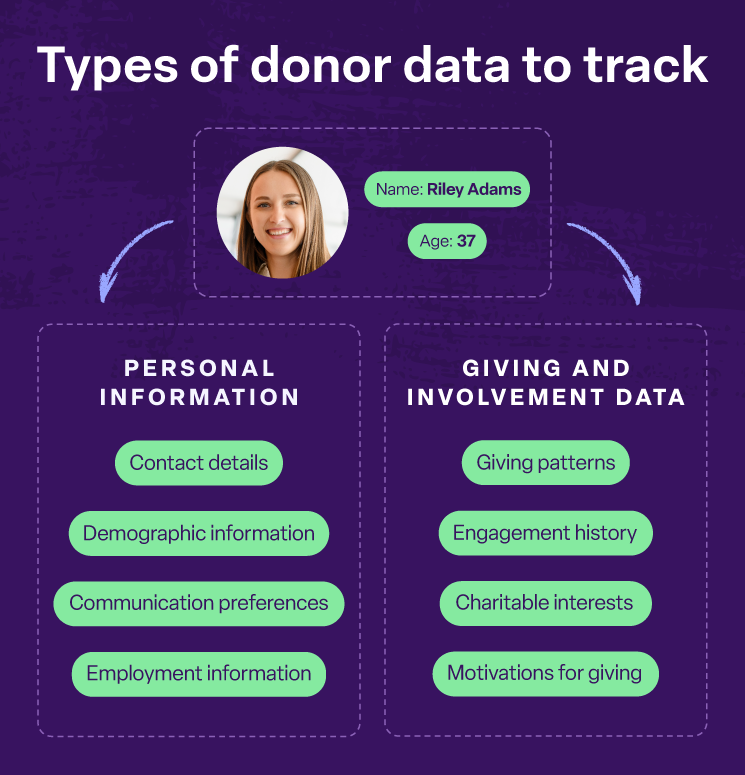
Secure donor profiles
Since most of the benefits of a donor database lie in the information it stores, make sure to evaluate potential databases based on which data they can store and in what ways. Primarily, this means looking at the donor profile feature.
In each donor profile, you should be able to easily view and update all the information you need in a central location.
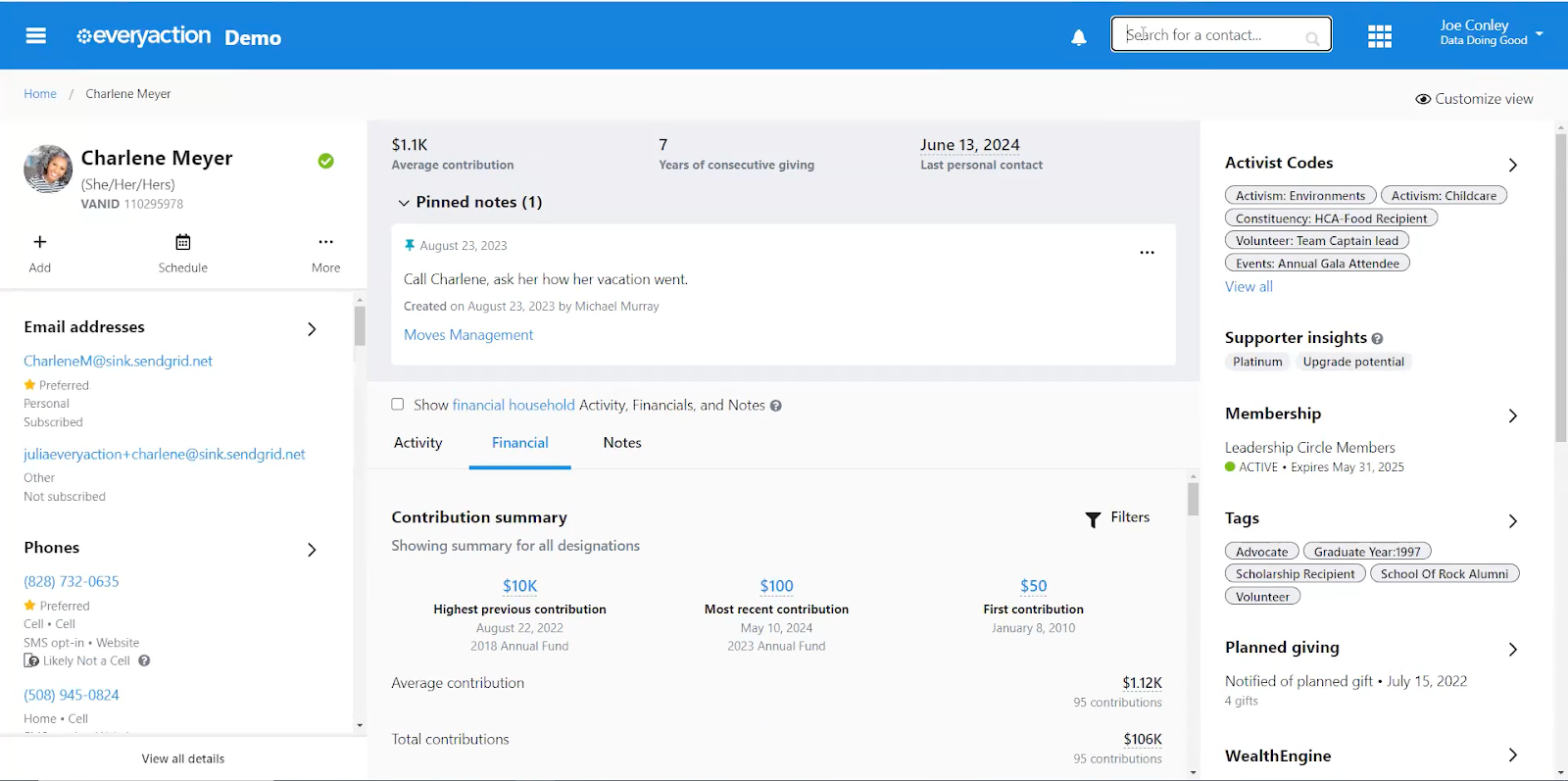
The right donor database should offer intuitive features that allow your staff to efficiently enter a new supporter record, find specific information, and update existing data as needed. It will also ensure that all donor data is secure with security measures like user permissions and access restrictions.
Giving potential
Your donor database should do more than track your donors’ giving history and patterns — it should also be able to analyze that history and predict their future giving potential.
These predictions help you target donors effectively and make appropriately sized fundraising asks. Plus, giving scores and estimated financial capacity data allow you to easily identify major donor fundraising potential within your existing support base.
Engagement history
Beyond financial giving data, being able to track and view data about donors’ involvement is also essential. Your database should enable you to easily track data about a donor’s event attendance, volunteering history, advocacy actions, communications they interact with, and any other ways your supporters engage with your nonprofit.
You should also be able to view engagement data in ways that support data-backed decision-making. As you evaluate donor database solutions, ask questions like:
- How is engagement history tracked?
- Is event attendance and volunteer data automatically recorded in donor profiles?
- Can you easily view a timeline of activity for a specific supporter?
- Is there a way to quantify supporter engagement within the platform?
- How easy is it to identify your most involved supporters?
- Are information fields configurable so you can track the most relevant information?
Custom fields
To accommodate your nonprofit’s unique needs, you’ll want to be able to set up custom fields in your donor database so you can track additional data points that are important to your organization. Ideally, your donor database should offer unlimited custom fields to store text, dates, and numbers.
Make sure that you have a good grasp of how custom fields work in each of the donor databases you consider. It should be easy for you to set up custom fields to track unique information without needing to involve a software expert or pay for additional services.
Segmentation
Donor segmentation features allow you to divide your donors into groups based on relevant characteristics that they share. For instance, you could segment donors by giving level, communication preferences, or how recently they donated. This process enables you to tailor outreach and appeals, target donors more effectively, and streamline your marketing and fundraising efforts.
Your online fundraising tool should let you create an unlimited number of donor segments and easily locate them using filters. If the database includes email tools, you should be able to send emails to certain segments while automatically personalizing email content to each individual within the segment.
Intuitive reporting
Reporting capabilities are vital for getting a holistic view of your donors and their actions. Choose a donor database with multiple out-of-the-box reports and custom report creation options. Also, look for robust reporting dashboards that automatically analyze your data and visualize it in clear ways.
For instance, this example of a report from Bonterra Fundraising and Engagement shows information about a nonprofit’s monthly giving program, including a graph of their average contribution size and a table of historical program growth:
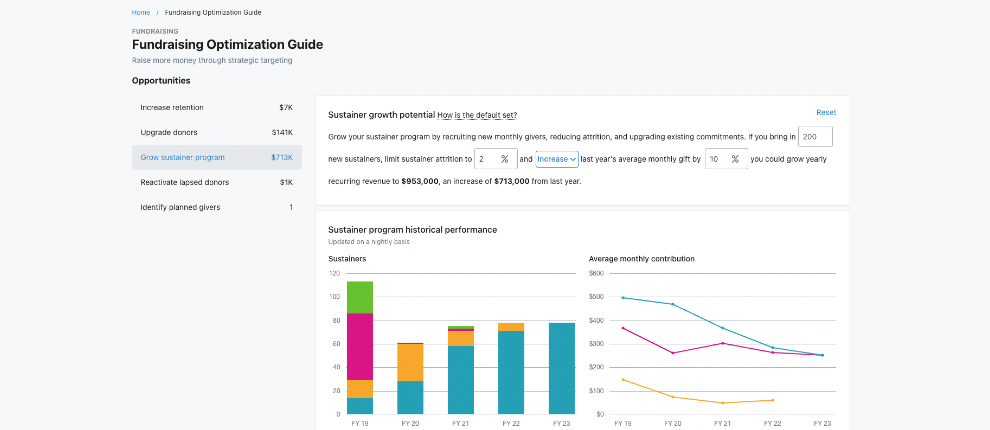
Integration capabilities
While having a donor database is crucial for your nonprofit, most nonprofits also need additional software to manage email campaigns, host events, launch advocacy campaigns, and more.
Whether you use a marketing automation system or online auction software, ensure that your chosen donor database can easily integrate with all of your other fundraising tools to help streamline your processes.
Scalability
Finally, evaluate if the donor databases you consider have the potential to support your organization’s goals in the long run. For example, you may be a small nonprofit now, but your donor base could grow exponentially in a few years. Whenever the time for growth comes, you’ll be better prepared if your donor database can scale with you.
To determine a system’s scalability, explore the available software plans or tiers that the donor database offers. Are there tiers above the plan you’re currently interested in? How many contact records can you store at each level? Additionally, ensure that the provider is still actively supporting and updating the system.
How to choose the best donor database for your nonprofit
Now that you know what benefits, data types, and features to consider, we can walk through choosing a donor database that aligns with your organization’s needs and goals.
Be mindful that selecting and implementing new software takes time, especially if you are looking for something as central to your organization as a donor database software for small nonprofits. Follow these steps for a thorough donor stewardship process:
- Evaluate your needs. Discuss your organization’s donor database needs with your executive director, board members, and other relevant team members. Identify the challenges you have with your current system and which needs are the most pressing.
- Identify must-have features. These should include both unique requirements that other nonprofits may not have and the most important features that your donor database must have. Focus on the critical features for your nonprofit that not all donor database systems will have, such as certain integrations.
- Determine your budget range. Meet with your board and relevant team members again to discuss your budget for the entire software adoption process. This can help you narrow down your list early in the process, saving you time.
- Research your options and schedule demos. Explore solutions recommended by peers, top provider lists, and other online resources to see which ones match your needs and budget. Then, choose a few providers to schedule demos with to see the software up close and ask any questions you have.
- Make your decision. Based on the information you glean from research and demos, choose the donor database that best fits your nonprofit and start the implementation process.
Remember that your donor database will be an important part of your nonprofit’s operations for years to come, so make sure to create a thorough plan and have clear priorities to focus your search.
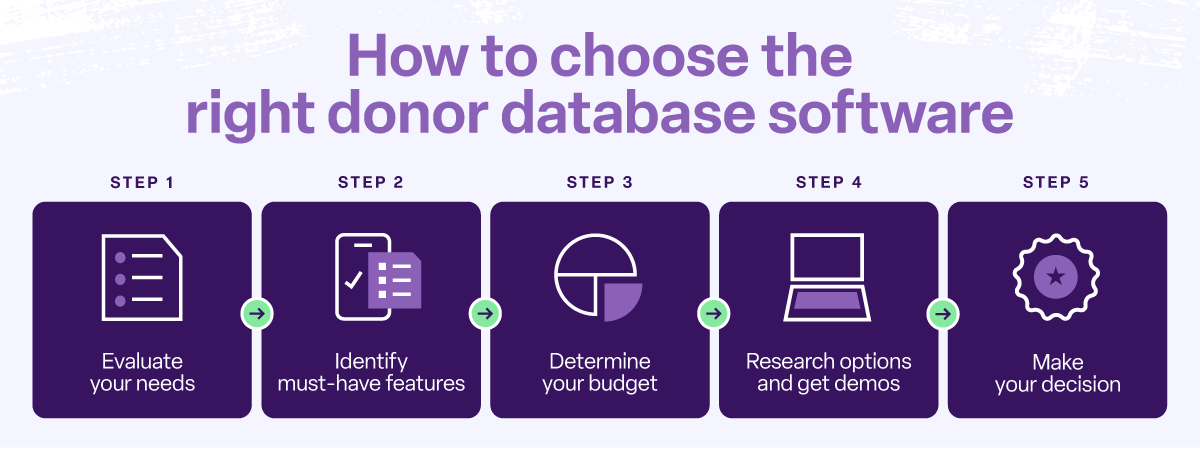
7 donor database solutions to consider
Keeping those steps in mind, start your search by exploring our list of the best donor database management software options available to nonprofits.
1. Bonterra Fundraising and Engagement
Bonterra offers comprehensive donor database with a full suite of fundraising tools. Our software provides you with a unified platform experience that meets all your fundraising and donor engagement needs.
Our fundraising and engagement solutions come with all the essential donor database features you need, including:
- Supporter biographies in addition to donor profiles so you can view biographic and demographic information side-by-side.
- Engagement points to quantify donors’ levels of engagement with your organization.
- Workflow automations for adding contacts, communicating with donors, and more.
- Moves management tools that help you identify, cultivate, and retain major donors.
The Bonterra network includes over 16,000 organizations, and our donor database software has helped nonprofits raise over $3.5 billion collectively.
2. Raiser’s Edge NXT
Blackbaud’s Raiser’s Edge NXT is another popular donor database option for nonprofits with a large number of supporters. It aims to provide fundraisers with end-to-end gift management tools to improve donor relationships.
Essential features:
- Data health tools to improve data quality and ensure accuracy.
- AI-suggested fundraising ask amounts helps personalize outreach and maximize giving potential.
- Integrated communication tools for email, SMS, and social media campaigns.
- Advanced reporting and analytics to track fundraising performance and identify trends.
3. Salesforce Nonprofit Cloud
Salesforce is a CRM provider for for-profit companies, but it also offers a solution designed for nonprofits called Nonprofit Cloud. This donor database is built on the core Salesforce platform but comes with added fundraising, program management, and assessment tools.
Essential features:
- Contact management tools to track constituent information like demographics and communication preferences.
- Plan, track, and manage volunteers with integrated program management capabilities.
- Track grant applications by managing awards and reporting on grant outcomes.
- Extensive app options help streamline tool integrations.
4. Givebutter
For nonprofits on a tight budget, consider the free donor database, Givebutter. Givebutter is designed to be a simple, free nonprofit CRM that’s quick to set up. The platform comes with basic features like donor profiles, segmentation, and custom reporting. It also includes integrated marketing tools to help you improve donor communications. However, while the system is free for nonprofits, it charges your donors fees.
Essential features:
- Donor profiles allow you to store basic information and track donation history.
- Customizable donation forms to create and embed online forms on your website.
- Peer-to-peer fundraising capabilities enable you to expand donation strategies.
- Email marketing tools allow you to send basic email campaigns to your supporters.
5. Bloomerang
Bloomerang is another donor database that acts as a full-suite solution for nonprofits. The platform includes donor management, volunteer management, and fundraising tools to help growing nonprofits streamline their operations, but it has more limited customization options. You might consider this database if your organization is small to mid-size and customization isn’t your top priority.
Essential features:
- Track donor information, manage relationships, and automate communications.
- Volunteer management tools to recruit and manage participants, track hours, and recognize contributions.
- Customizable online forms to support multiple membership programs.
- Email marketing features to help you create and send professional-looking email campaigns.
6. Zeffy
Zeffy is an online fundraising platform with a free donor database solution to store and organize donor and member data in one place. With online payment and auction capabilities, Zeffy is a good basic donor database option for nonprofits with little to no budget.
Essential features:
- Share forms with supporters and accept payments online.
- Peer-to-peer campaign capabilities make it easy for your community to participate.
- Raffle, lottery, and auction tools to diversify your fundraising strategies.
- Online ticket sale capabilities for streamline fundraising events.
7. WildApricot
WildApricot is a nonprofit CRM platform designed to streamline operations and enhance donor engagement. It offers automated features such as reporting and customizable marketing campaigns, along with a mobile app for managing tasks on-the-go.
Essential features:
- Website builder tools with drag-and-drop features for mobile-friendly themes.
- Online payment tools to securely accept and track digital sales.
- Email and contact database to easily communicate with members.
- Built-in online store so you can sell products and accept payments instantly.
Get started with the best donor database for nonprofits
Donor databases for nonprofits allow you to create targeted, personalized messages and fundraising appeals, resulting in stronger relationships and greater fundraising success. This is why it’s crucial for you to take your time and thoroughly research all your options to ensure your nonprofit’s success with using your new donor database.
Donor database FAQs
Can I use spreadsheets to track my donors?
While you can use spreadsheets to track data, dedicated donor management software offers more robust features to streamline data tracking and minimize time spent manually entering information.
How do you track donations for nonprofit organizations?
Nonprofits can track donations using:
- Donor database software: A more robust solution that automates many tasks, providing a centralized database for donor information, streamlining data entry, generating reports for analysis, and facilitating personalized communication with donors.
- Spreadsheets: A simple and cost-effective method for small organizations with limited fundraising needs.
Are there free donor databases?
Yes, there are free donor databases but they usually offer limited capabilities or require a paid upgrade to access advanced functionalities.
Work with Bonterra



